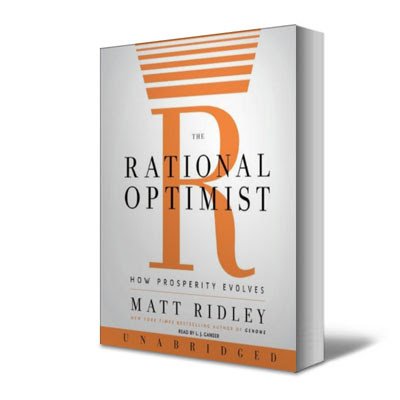Matt Ridley's The Rational Optimist is a history of progress from the Stone Age to current times. The book is based on the premise that man evolved from cave dwellers through specialization and exchanging tools and ideas. He suggests that the ability to specialize and trade is what makes humans unique. From the very early times when people separated into hunters and gatherers, we have moved to specialization and interdependence where almost no one individually catches their own food or makes their own shelter. We created a system where everyone can specialize and trade with others who specialize. This means that those best at making houses make houses, those best at making food make food, and by trading we can each benefit from that which others do and vice versa. Self-reliance equals subsistence; interdependence through trade equals ingenuity and a boom in living standards.
Matt Ridley provides a convincing evidence to show man's great progress in economic, farming, environmental concerns, cultural concerns, energy usage, and knowledge dimensions. He refutes the counterclaims and explains why there have always been many irrelevant doomsday scenarios at any point in time.
Here are some interesting conclusions from his analysis:
- Markets in goods and services work so well that it's hard for them to fail to deliver efficiency.
- The world's poor are advancing twice as fast as the rich. Abject poverty could largely end by 2035.
- Improving IQ is due to lower end rising, partly due to nutrition.
- Fire allowed for smaller stomach which allowed for larger brain. Less time to cook, more foods available, and more calories consumed were made available by cooking, which also resulted in less energy needed to digest.
- Humans consistently extinguished large game as they expanded.
- Fossil fuel development led to end of slavery as machines powered by fossil fuels could produce more than slaves.
- Around 65,000 years ago a few hundred people left Africa. This was not the first wave, but it was the first modern man. They made it to Australia roughly 45,000 years ago and pockets of their descendants have remained genetically isolated, seemingly the same as us today.
- Trust is huge in making society better. Exchange breeds trust and vice versa.
- More than half of all people may be endowed to be more pessimistic. Pessimism sells.
- Accounting in trade came before written language.
The book highlights the fact that humanity is stronger than it has ever been in terms of health, food and even physical height. The ability of humans to exchange ideas and adapt has been the key to our success and will provide the impetus for us to achieve greater heights in the future. I found this book to be incredibly insightful and a very worthwhile read.

